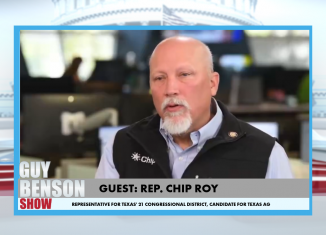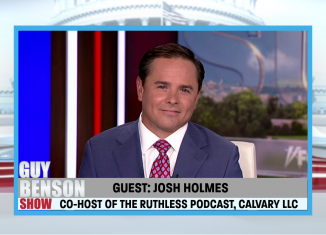Leader Mitch McConnell (R-KY) Praises Sens Manchin And Sinema For Their ‘Courage’ In Preserving The Filibuster

Listen To The Full Interview Below:
Senate Republican Leader Mitch McConnell (R-KY), joined Fox News Radio’s Guy Benson Show to discuss the ongoing discussions over an bipartisan infrastructure deal. McConnell also praised both Senators Joe Manchin and Kyrsten Sinema for their courage in defending the Senate as an institution, by refusing to nuke the filibuster.
Leader McConnell praised Senators Manchin and Sinema saying,
“Yes. Only two of them are willing to publicly defend the institution, and I want to, you know, say to both Senator Manchin and Senator Sinema, I admire their – the courage in defending the Senate as an institution, and, basically, I guess, saying you don’t change the rules to try to win the game. For them to win the game, they need to win more seats, and I’ve been here, Guy, when they did have 60. They had 60 the first two years of President Obama, they could do pretty much what they wanted to do, and they did. Well, they don’t have 60 now. They don’t have a mandate. And breaking the rules of the Senate to achieve a short-term partisan advantage is bad for America, bad for the Senate, and shouldn’t be done. And hopefully, thanks to these two courageous Democratic senators, it won’t be done.”
McConnell also weighed in on the infrastructure talks saying,
“Well, there isn’t a bill yet. But if there is an infrastructure bill that is credibly paid for, that is not any more debt, we just racked up a lot of debt understandably last year during the pandemic, not acceptable this year with the pandemic over — credibly paid for without changing the 2017 tax bill, which we think was the singular, other than judges, the single biggest accomplishment during the previous four years for the country, it’s worth taking a look at. There is no deal yet, but the negotiations are continuing. Infrastructure is an area, potentially, of bipartisan agreement, but the devil’s in the details, and we’ll have to make sure there’s not some kind of hidden tax increase in there. And I want to see that it’s credibly paid for. So, I think it’s too early to say whether this will come together or not, but there are constructive talks going on.”
FULL TRANSCIPT BELOW:
GUY BENSON, FOX RADIO HOST: And joining me now to discuss what happened yesterday is the Senate Republican leader, Mitch McConnell of Kentucky. Senator, it’s great to have you back.
SEN. MITCH MCCONNELL (R-KY): Glad to be with you.
BENSON: Before we get to S-1, I do have to ask you, just out of curiosity, because we’ve been covering this Sheldon Whitehouse story, one of your colleagues on the other side from Rhode Island; just hypothetically, if you were a member of an all-white club for let’s say the last 15 years or so, and you’d promised to leave and you never did and you eventually justified it by saying it’s just a Kentucky tradition, do you think that might be a national news story?
MCCONNELL: It would be, and you might be interested to know that when we vet on the Judiciary Committee, upon which Sheldon sits, when they vet judges, one of the things they look for, do they have private club memberships that discriminate, and if they don’t resign from them, they don’t act on them. So, I think in a large —
BENSON: Oh.
MCCONNELL: — part of the country, including there on the Judiciary Committee, when they vet judges — in fact, I remember a judge a number of years ago – a good guy – who resigned from a club, and this was probably 20 years ago, Guy, otherwise he wouldn’t have been confirmed.
BENSON: That is a very interesting little tidbit, especially given the antics, to put it kindly, that we’ve seen from this particular senator in his perch, or from his perch on that committee, especially with Justice Kavanaugh and that whole circus. But I did not know that, that little detail, and we’ll make sure that more people learn about that, because I think that’s certainly a question that a journalist — any journalist might ask of Sheldon Whitehouse. It would certainly be asked of any Republican or any of your colleagues if the shoe were on the other foot. So, as I alluded –
(CROSSTALK)
BENSON: Go ahead, please.
MCCONNELL: Yeah, I don’t have any particular observations about Sheldon. What I do know is that for a long time on the Judiciary Committee as part of the vetting process for federal judges this question is asked. And if they don’t — if they belong to one, they’re disqualified. They’re given the opportunity to resign, typically, but it’s a disqualifier to be a federal district judge.
BENSON: Well, he promised to resign apparently in 2006, then he didn’t. So, I guess it’s disqualifying for a judge, but not disqualifying to be a Democratic member of the committee that would do the disqualifying of the judge, which is sort of an interesting twist of fate there. Senator McConnell, let’s talk about yesterday, the 50/50 vote which killed off S-1. I was observing that it seemed like a lot of our friends in the news media are calling this bill a voting rights bill, or it’s a voting rights legislation, and that, I think for a lot of people who only read headlines, would say, why on earth would Republicans, unless they were hostile to democracy, why would they filibuster or be against legislation like this? In your view, if you just give us a brief tour through this legislation, what are the elements of it that you found so offensive that you were willing to really take the lead on defeating this legislation?
MCCONNELL: Well first, with regard to the press buying the title that they put on the bill, it’s absurd. No one in America is being denied the right to vote. No one in America is being restricted in any way by some of these new state laws that are being passed in the wake of adopting some unusual procedures during the pandemic. So, they call it a voting rights bill, but here’s what it is — a partisan takeover of the Federal Election Commission which has been three/three for over half a century so that neither party can take advantage of each other. The Federal Election Commission is the agency that kind of polices the political environment. So they want to turn that from a judge into a prosecutor, controlled by the president. In addition to that, taxpayer funding of elections — for all small donations you get, the government would send you six dollars. Well, my goodness, I think a candidate for the Senate in California would probably get a couple a hundred million dollars from the taxpayers to run, an utterly outrageous proposal. It would prevent photo–
(CROSSTALK)
BENSON: Wait, hang on. Just to clarify on that point, if someone, like let’s say one of my left-wing friends from college, and we get along great, but we disagree, if one of them sent a dollar to AOC for her reelect, taxpayers would match that dollar six times over.
MCCONNELL: Yeah. I mean, it would be a massive amount of money subsidizing for example those who benefit from the online effort the Democrats are very successfully involved in called ActBlue. Look, the campaigns are being well-funded these days. My opponent last year, Guy, spent a hundred million dollars, There’s no lack of money coming from citizens who volunteer their contributions to candidates of their choice without having the taxpayers subsidize political campaigns, in effect buying ads for campaigns where they actually oppose the candidate.
(CROSSTALK)
BENSON: Yeah, I mean, it’s crazy. Look, if people want to send a hundred-million-dollars to Amy McGrath to lose by whatever it was, 25 points, they can decide what that return on investment looks like for them. I don’t want to have to be on the hook for that return on investment.
MCCONNELL: Absolutely. Another item, they would prevent photo I.D. at the polls, something that 80 percent of Americans think is a very important part of verifying that the person who’s voting is who they — who he says he is. So, those are just some of the items. It’s a laundry list of deplorable ideas designed —
(CROSSTALK)
BENSON: Ballot harvesting?
MCCONNELL: Yeah, ballot harvesting, you know, the ability of people to go around and collect ballots from others, presumably fill them in and turn them in. Just an utter disaster. Look, the main point is, there’s no need to federalize elections in this country. The Democrats have wanted to do it for years. They’ve wanted to take over the entire federal election system, and this bill would have done just that. So, no one should be surprised that none of my members supported it and all of theirs did. That tells you they thought it would be to their advantage to rewrite the rules of the game in order to make it possible for them to win more often.
BENSON: Although Senator Joe Manchin from West Virginia had put out a piece indicating that he was against the bill itself, if that ever came down to an up or down vote — it didn’t get that far because the filibuster was successful. He’s floated his own plan somewhere else. I know Senator Schumer, the majority leader was saying that they might come back and try to take another bite at this apple, maybe with Manchin’s bill at some point. What I do find interesting about Manchin’s proposal, Senator, is he is now, unlike S-1, he would mandate a voter I.D., and strangely we’re seeing a lot of Democrats who for years have told us that voter I.D. laws are racist, Jim Crow, voter suppression, horrible, now they’re sort of lining up and saying, well, we see the polls, and all right, maybe it’s fine. I kind of have whiplash on that one issue at least.
MCCONNELL: Well, I think the fact that Stacey Abrams, likely the Democratic candidate for governor in Georgia, who seems to be the person who gives the seal of approval for voting rights bills for Democrats, endorsed the Manchin bill, should indicate that they still think it’s to their advantage. And let me mention one feature of the Manchin alternative; it seeks to remove redistricting from state legislatures. Well, why would they want to do that? Well, they want to do that because Republicans control more state legislatures than the Democrats did. And that’s a clear violation of the Constitution. The founders of this country put redistricting in the hands of the state legislatures, and that will go on at that level after the census’ figures are turned in, in September, just like it has every 10 years since the beginning of the country.
BENSON: Senator McConnell, we’ve now seen that this was not an unexpected outcome, right, they didn’t even have 50 votes for this bill, let alone 60 to get past the filibuster. So, we’ve seen some people agitating to get rid of the filibuster; some of the Democrats, a small handful of them, have said that they’re unwilling to go that route, others apparently agree with them, but they don’t want to say it out loud. There’s sort of some raging among some of your colleagues; I saw Senator Schumer’s done a lot of you know thumping on the desk and gesticulating and pointing over at the other side of the chamber and raising his voice and all of that. It strikes me as sort of a theater for the base that may have been deluded into thinking that maybe this bill A, was a good and B, had a chance of passing. When they talk about the filibuster in particular, and it seems like once again there’s a newfound attempt to go after the filibuster and get rid of it. I — they might even ask Joe Manchin about it for a record one-millionth time, might he change his opinion — they’re lobbying him constantly, and by they, I mean not just activists, but journalists, they ask him every day. What is your reaction as you see a lot of people who are on the record in writing, Democrats in the Senate just a few years ago talking about the sanctity and the importance of the filibuster to the institution and really to the country when you guys had you know a majority in both houses and you had the presidency, they said we must protect the filibuster, and a lot of them, just on a dime, switched positions. There have been almost no challenging questions, you know, why did you switch your position on this? And they’re almost universally embracing the Jim Crow smear about a tactic that they themselves have used hundreds of times in recent years.
MCCONNELL: It’s all ridiculous. You know, President Trump asked me to get rid of the filibuster, and I politely said no because I thought the institution of the Senate was more important than any short-term advantage of a majority that, may, tomorrow be in the minority. And back when President Trump was in office and we were the majority, about half the Democratic Conference signed a letter saying they thought the legislative filibuster was the essence of the Senate. Now that the players have changed, we have a Democrat White House, a narrow Democratic majority in the Senate, only –
BENSON: There’s a new essence – there’s a new essence in the air.
MCCONNELL: Yes. Only two of them are willing to publicly defend the institution, and I want to, you know, say to both Senator Manchin and Senator Sinema, I admire their – the courage in defending the Senate as an institution, and, basically, I guess, saying you don’t change the rules to try to win the game. For them to win the game, they need to win more seats, and I’ve been here, Guy, when they did have 60. They had 60 the first two years of President Obama, they could do pretty much what they wanted to do, and they did. Well, they don’t have 60 now. They don’t have a mandate. And breaking the rules of the Senate to achieve a short-term partisan advantage is bad for America, bad for the Senate, and shouldn’t be done. And hopefully, thanks to these two courageous Democratic senators, it won’t be done.
BENSON: On the issue of infrastructure, do you support the framework that is now – I guess, there’s 21 senators that have co-sponsored it at least, including 11 of your members on the Republican side, 10 on the Democratic side. It’s well short of what the White House and the Democrats were hoping for, but it – it seems, at least to me, on the surface to be pretty reasonable, paid for, no tax increases, not $2 plus trillion. It seems like the Democratic leadership might have a real tough time on their hands if they have at least 10 of their members in support of this, whereas their left flank is furious and would be outraged if it were to pass. Strategically speaking, would it be smart for Senate Republicans to rally around this bill?
MCCONNELL: Well, there isn’t a bill yet. But if there is an infrastructure bill that is credibly paid for, that is not any more debt, we just racked up a lot of debt understandably last year during the pandemic, not acceptable this year with the pandemic over — credibly paid for without changing the 2017 tax bill, which we think was the singular, other than judges, the single biggest accomplishment during the previous four years for the country, it’s worth taking a look at. There is no deal yet, but the negotiations are continuing. Infrastructure is an area, potentially, of bipartisan agreement, but the devil’s in the details, and we’ll have to make sure there’s not some kind of hidden tax increase in there. And I want to see that it’s credibly paid for. So, I think it’s too early to say whether this will come together or not, but there are constructive talks going on. I’ll have to –
BENSON: OK, fair enough. We’ll keep an eye on that. Last question briefly, when I talked to you ahead of the 2020 cycle and I asked you about the Senate races, you said it was going to come down to a knife fight in a phone booth, I believe was your turn of phrase, and that turned out to be exactly right, and the Senate is 50/50 right now. Looking ahead to 2022, if you could just give us your 15 or 30-second synopsis of the early stages of the dynamics, what you’re seeing?
MCCONNELL: Hard to do in 15 or 20 seconds. I think it’s going to be close again. What we’re hoping for is the trend in this country for the party of the president to lose seats in the House and Senate two years into a new administration holds up. I think this administration has done enough things that give us a really good argument to make that the best way to turn Joe Biden into a moderate would be to make Mitch McConnell the majority leader of the Senate.
BENSON: Very succinctly stated, and we can delve into more details on that front next time we chat, but for now we’re up on a break. Senate Republican leader Mitch McConnell of Kentucky. Senator, always a pleasure. Thanks for stopping by.
MCCONNELL: Thanks.








